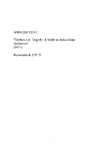| dc.contributor.author | Kargopoulos, Phillipos V. | |
| dc.date.accessioned | 2020-09-02T10:42:21Z | |
| dc.date.available | 2020-09-02T10:42:21Z | |
| dc.date.issued | 1974 | |
| dc.identifier.uri | http://hdl.handle.net/11728/11548 | |
| dc.description.abstract | Despite the overmentioned influence of Aristotle and the multitude of
interpretations of Aristotle from the Hellenistic times to the interpretation
of W. Jaeger and ewn to the more recent interpretations, a careful and unprejudiced
(to the possible extent) examination of the arguments of Aristotle
would persuade us that Aristotle is one of the least understood and probably
most misunderstood philosophers. Piatonist and anti-platonist, realistic
and idealistic, common sense and philosophical, charges or .praises
have been made for and against Aristotle. What the author of this short essay
believes is that one should study the Aristotelian arguments in Aristotle's
own terms without imposing his own terms and prejudices on them, and
what he proposes to do is to give an example of such a study, in analyzing
the third part of the sixth chapter of the Poetics. | en_UK |
| dc.language.iso | en | en_UK |
| dc.publisher | Κέντρο Ερεύνης της Ελληνικής Φιλοσοφίας (Κ.Ε.Ε.Φ.) | en_UK |
| dc.relation.ispartofseries | Φιλοσοφία, Επετηρίς του Κέντρου Ερεύνης της Ελληνικής Φιλοσοφίας της Ακαδημίας Αθηνών;4, σ. 259-273, 1974 | |
| dc.rights.uri | http://creativecommons.org/licenses/by-nc-nd/4.0/ | en_UK |
| dc.subject | Research Subject Categories::SOCIAL SCIENCES::Social sciences::Psychology | en_UK |
| dc.subject | Aristotle influence | en_UK |
| dc.subject | Poetics | en_UK |
| dc.subject | Aristoteleian science | en_UK |
| dc.title | Mythos and Tragedy: A Study in Aristotelian Aesthetics | en_UK |
| dc.title.alternative | Μύθος (πλοκή) και τραγωδία στην ποιητική του Αριστοτέλους | en_UK |
| dc.type | Article | en_UK |


